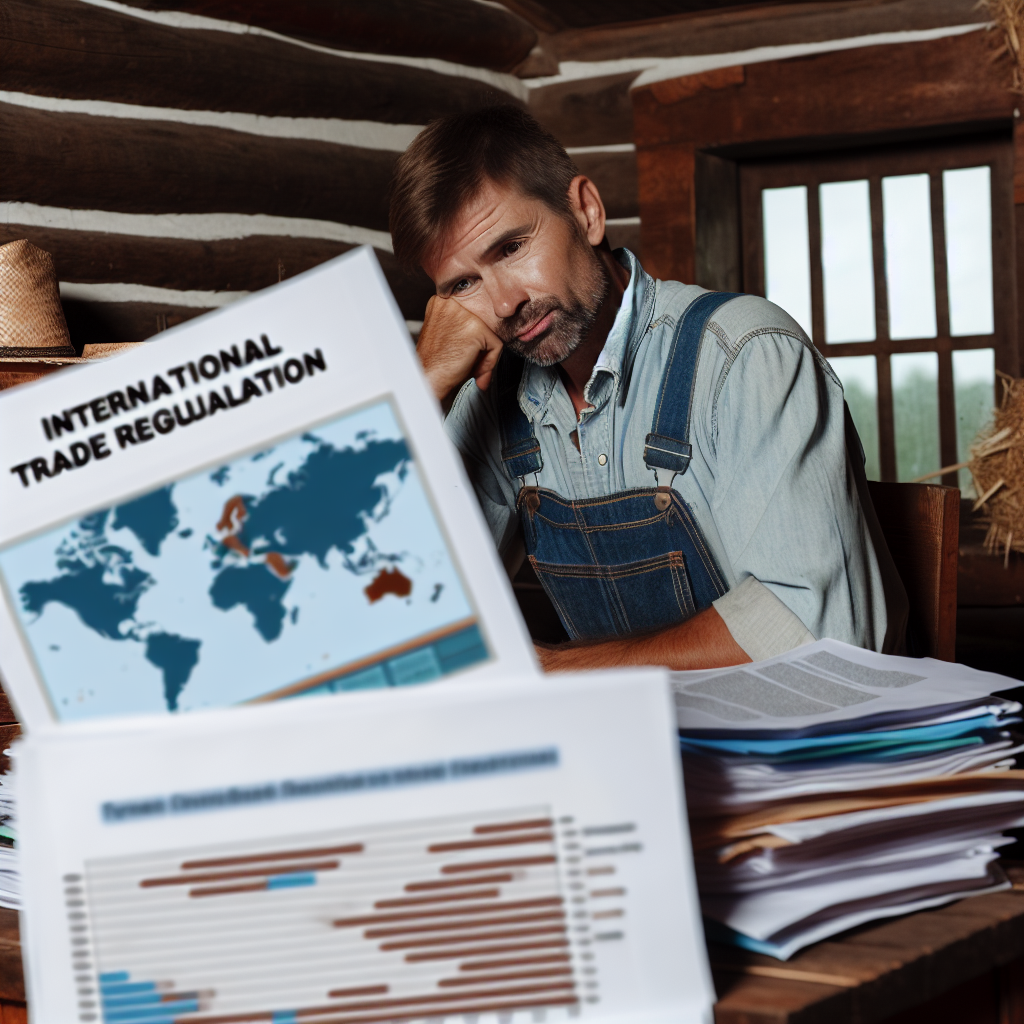Understanding the Basics of International Trade Regulations for Farmers
Importance of International Trade
International trade significantly impacts farmers around the globe.
It opens up new markets for their products.
Moreover, it allows farmers to access essential inputs and technologies.
By understanding trade regulations, farmers can improve their competitiveness.
Consequently, they can better navigate global trade challenges.
Key Trade Agreements
Farmers should familiarize themselves with essential trade agreements.
Agreements like NAFTA, now USMCA, shape trade between North American countries.
Similarly, the European Union’s Common Agricultural Policy affects farmers’ export markets.
These agreements often include provisions that influence pricing and access.
Thus, staying informed about these agreements is vital for success.
Essential Regulations and Standards
Farmers must comply with several key regulations and standards.
Food safety regulations ensure products meet health requirements.
Additionally, phytosanitary measures help prevent pests and diseases.
Labeling requirements provide consumers with essential information.
Farmers should consider the specifics of each market they enter.
Transform Your Agribusiness
Unlock your farm's potential with expert advice tailored to your needs. Get actionable steps that drive real results.
Get StartedCustoms Procedures and Documentation
Understanding customs procedures is crucial for smooth trade operations.
Farmers need proper documentation for their goods at customs.
Documents such as invoices, packing lists, and certificates are necessary.
In addition, knowing the tariffs applicable to products can save costs.
Farmers should keep abreast of changing customs regulations.
Trade Barriers and Challenges
Farmers often face various trade barriers that can hinder exports.
Tariffs increase costs and can make products less competitive.
Quotas limit the amount of goods that can be exported or imported.
Additionally, non-tariff barriers can create challenges in various markets.
Awareness of these barriers can help farmers develop strategies to address them.
Resources and Support
Farmers can access numerous resources to navigate trade regulations.
Government agencies often provide guidelines and assistance.
Such organizations include the U.S. Department of Agriculture and trade commissions.
Additionally, trade associations can offer valuable insights and support.
Networking with other farmers can also provide practical advice and experiences.
Key International Trade Agreements Impacting Agriculture
Understanding the Role of Trade Agreements
Trade agreements play a vital role in agricultural trade.
They help define rules and standards for international commerce.
Farmers must understand these agreements to navigate the global marketplace.
Furthermore, compliance with these regulations influences market access.
World Trade Organization Agreements
The World Trade Organization (WTO) governs international trade rules.
It aims to promote free trade and reduce barriers to entry.
WTO agreements set standards for tariffs and trade policies.
Farmers benefit from these rules as they enhance market opportunities.
North American Free Trade Agreement
North American Free Trade Agreement (NAFTA) fosters trade between Canada, Mexico, and the U.S.
Showcase Your Farming Business
Publish your professional farming services profile on our blog for a one-time fee of $200 and reach a dedicated audience of farmers and agribusiness owners.
Publish Your ProfileUnder NAFTA, tariffs on agricultural products were reduced significantly.
This helped enhance cross-border trade and increase market access.
As a result, farmers expanded their reach, benefiting from larger markets.
European Union Common Agricultural Policy
The Common Agricultural Policy (CAP) supports European farmers.
It regulates the agricultural market and provides financial assistance.
CAP aims to ensure food security and farm sustainability.
Farmers can access subsidies and programs that promote agricultural innovation.
Trans-Pacific Partnership
The Trans-Pacific Partnership (TPP) aims to enhance trade across the Asia-Pacific region.
It includes provisions for agricultural products, promoting more open markets.
For instance, it aims to eliminate tariffs on certain categories of goods.
Farmers in member countries can gain competitive advantages through access to new markets.
Regional Comprehensive Economic Partnership
The Regional Comprehensive Economic Partnership (RCEP) focuses on Asia-Pacific trade.
It encompasses numerous countries, boosting trade among them.
RCEP aims to simplify trade rules, benefiting agriculture and food products.
Farmers can expand their exports through reduced trade barriers.
Importance of Staying Informed
Farmers must stay updated on international trade agreements.
Changes in regulations can significantly affect their businesses.
Therefore, continuously monitoring these agreements is essential.
Resources like trade associations and government publications can provide valuable insights.
Navigating Tariffs and Non-Tariff Barriers in Global Markets
Understanding Tariffs
Tariffs are taxes imposed on imported goods.
They increase the cost of foreign products in the domestic market.
Farmers should monitor tariff rates on their products.
This helps them price their goods competitively overseas.
Additionally, tariffs can protect local farmers from foreign competition.
Identifying Non-Tariff Barriers
Non-tariff barriers are regulations that restrict trade.
These can include quotas, import licenses, and standards regulations.
Understanding these barriers is essential for successful exportation.
Farmers must comply with foreign food safety standards.
Moreover, labeling requirements can vary significantly between countries.
Adapting to Trade Agreements
Trade agreements can significantly influence market access.
Countries often enter agreements to reduce tariffs and barriers.
Farmers should familiarize themselves with applicable trade agreements.
Examples include the USMCA and the EU’s common market policies.
These agreements can create opportunities for growth.
Researching Market Trends
Market trends can impact agricultural exports substantially.
Farmers need to stay informed about global demand fluctuations.
Seasonal demand affects prices and selling opportunities.
Additionally, trade disputes can disrupt markets unexpectedly.
Farmers must be agile in response to these changes.
Collaborating with Trade Experts
Engaging with trade experts can provide valuable insights.
Showcase Your Farming Business
Publish your professional farming services profile on our blog for a one-time fee of $200 and reach a dedicated audience of farmers and agribusiness owners.
Publish Your ProfileThese professionals can guide farmers through complex regulations.
They can also assist in identifying the best markets for products.
Additionally, trade associations offer resources and networking opportunities.
Collaboration enhances a farmer’s ability to navigate trade effectively.
Utilizing Technology for Compliance
Technology can simplify the compliance process.
Software tools help manage documentation requirements effectively.
Farmers can track tariff changes using online resources.
Furthermore, data analytics can identify emerging market opportunities.
Investing in technology ultimately supports trade success.
Discover More: Effective Supply Chain Management for E-commerce Farming
Documentation and Compliance: What Farmers Need to Know
Understanding Trade Regulations
Farmers must stay informed about international trade regulations.
These rules can vary significantly by country.
Compliance helps avoid legal issues and financial penalties.
Understanding regulations ensures smooth trade operations.
Essential Documentation
Documentation is crucial for international trade.
Farmers need specific papers to export their products.
Common documents include invoices, packing lists, and certificates of origin.
Certificates verify that products meet quality standards.
Additionally, customs declarations are necessary for shipping.
Ensuring Compliance
Compliance with trade regulations involves ongoing education.
Farmers should attend workshops and training sessions.
These resources offer valuable updates on changing regulations.
Consulting with trade experts also provides useful insights.
Impact of Non-Compliance
Non-compliance can lead to significant repercussions.
Punitive actions may include fines and product seizures.
Additionally, farmers may face delays in shipping their goods.
Ultimately, this impacts their bottom line negatively.
Tips for Successful Documentation
Accurate record-keeping plays a vital role in compliance.
Farmers should regularly update their documentation practices.
Utilizing digital record-keeping can streamline this process.
Furthermore, always double-check for accuracy before submission.
This practice reduces the risk of errors that could lead to delays.
See Related Content: Remote Sensing Tools for Sustainable Farming
The Role of Customs and Import/Export Regulations in Agriculture
Understanding Customs Regulations
Customs regulations play a vital role in international trade for farmers.
These rules govern the flow of goods across borders.
They ensure compliance with national laws and standards.
Farmers must understand these regulations to avoid penalties.
Additionally, customs regulations can affect pricing and market access.
Importance of Import/Export Regulations
Import/export regulations safeguard the agricultural sector.
They prevent the entry of harmful pests and diseases.
Showcase Your Farming Business
Publish your professional farming services profile on our blog for a one-time fee of $200 and reach a dedicated audience of farmers and agribusiness owners.
Publish Your ProfileMoreover, these rules help maintain product quality and safety.
Farmers need to stay informed about these regulations.
Changes can impact their ability to trade effectively.
Key Considerations for Farmers
- Familiarize yourself with the specific regulations of target markets.
- Ensure proper documentation for all shipments.
- Stay updated on tariffs and trade agreements.
- Seek assistance from trade specialists if needed.
- Utilize technology for tracking regulations and compliance.
Consequences of Non-Compliance
Non-compliance with customs regulations can lead to severe consequences.
Punitive measures may include fines and delays in shipments.
In some cases, goods may be confiscated by authorities.
Additionally, non-compliance can harm a farmer’s reputation.
Building trust with partners hinges on adhering to regulations.
Resources for Navigating Regulations
Farmers can access various resources to understand regulations better.
Government websites provide detailed information on customs practices.
Industry associations often offer guidance and support services.
Networking with other farmers can reveal useful insights.
Consider attending trade seminars and workshops for education.
Find Out More: Social Media Marketing for Agribusiness Success

Strategies for Exporting Agricultural Products
Understanding International Trade Regulations
Farmers must familiarize themselves with international trade regulations.
These regulations vary by country and can impact exporting processes.
Compliance ensures products meet the necessary standards for foreign markets.
Furthermore, understanding tariffs helps in determining potential profits.
Researching Target Markets
Conduct thorough research on potential export markets.
Know the demand for your agricultural products in these regions.
Analyze consumer preferences and market trends to position effectively.
Additionally, investigate local competition to find your unique selling point.
Building Partnerships
Establishing partnerships is crucial for successful exporting.
Collaborate with local distributors who understand the market.
Networking with trade associations can open doors to valuable contacts.
Moreover, attending trade shows helps to showcase your products.
Adhering to Quality Standards
Maintain high-quality standards to appeal to international buyers.
Ensure all products undergo quality checks before shipping.
Additionally, certifications can enhance credibility in global markets.
Be aware of specific labeling requirements for different countries.
Navigating Export Documentation
Proper documentation is essential for exporting agricultural products.
Understand the necessary documents like export licenses and bills of lading.
Accurate paperwork minimizes delays at customs.
Moreover, consider hiring a customs broker for expert guidance.
Utilizing Technology for Efficiency
Implement technology to streamline exporting processes.
Use software tools to manage inventory and track shipments.
Automation can help reduce errors and improve efficiency.
Furthermore, technology aids in analyzing market data effectively.
Explore Further: Building Successful Partnerships In Agriculture Today
Impact of Sanitary and Phytosanitary Standards on Agricultural Trade
Overview of Sanitary and Phytosanitary Standards
Sanitary and phytosanitary standards play a crucial role in global trade.
Showcase Your Farming Business
Publish your professional farming services profile on our blog for a one-time fee of $200 and reach a dedicated audience of farmers and agribusiness owners.
Publish Your ProfileThese standards protect human, animal, and plant life from risks.
Countries implement regulations to ensure food safety and prevent diseases.
Compliance with these standards is essential for exporters.
Challenges for Farmers
Farmers often face challenges when meeting these regulations.
Different countries have varying requirements for imports and exports.
This disparity can create barriers for international trade.
Moreover, understanding these standards can be complex.
Impact on Market Access
Adherence to sanitary and phytosanitary standards significantly affects market access.
Countries may ban imports if products do not meet their requirements.
This can result in substantial financial losses for farmers.
In contrast, compliance opens doors to new markets.
Strategies for Compliance
Farmers can adopt several strategies to ensure compliance.
- Stay informed about the latest regulations in target markets.
- Invest in quality control measures throughout the production process.
- Engage with export consultants for expert guidance.
These actions can enhance product quality and safety.
Ultimately, they lead to increased competitiveness in the global market.
Collaboration and Support Programs
Collaboration among stakeholders is vital for success.
Government agencies can support farmers in navigating regulations.
They may offer training programs and resources for compliance.
Additionally, industry associations can provide valuable information.
Implications for Agricultural Trade
Sanitary and phytosanitary standards significantly shape agricultural trade.
Farmers who understand and comply with these standards enjoy better market access.
Their efforts contribute to a more robust global food system.
Resources and Tools for Farmers to Stay Informed on Trade Regulations
Government Resources
The government provides essential resources for farmers.
Websites like USDA offer updates on trade policies.
Agriculture professionals can access export assistance programs through these platforms.
Furthermore, government newsletters keep farmers informed about changes.
Industry Associations
Joining industry associations can be beneficial for farmers.
Organizations like the American Farm Bureau Federation provide valuable insights.
They also hold regular seminars on international trade topics.
Networking opportunities arise through these associations as well.
Online Learning Platforms
Online learning platforms offer courses about trade regulations.
Websites such as Coursera feature courses tailored for agricultural professionals.
These courses enhance understanding of international trade laws.
Additionally, webinars allow for interactive learning experiences.
Trade News Publications
Staying updated with trade news is crucial for farmers.
Publications like Agri-Pulse report on trade developments extensively.
Subscribing to such newsletters keeps farmers ahead in the market.
Farmers can also follow relevant social media accounts for real-time updates.
Mobile Applications
Mobile applications help farmers access trade information conveniently.
Apps like TradeMap provide data on market access and tariffs.
Additionally, weather and market price apps assist in decision-making.
Showcase Your Farming Business
Publish your professional farming services profile on our blog for a one-time fee of $200 and reach a dedicated audience of farmers and agribusiness owners.
Publish Your ProfileFarmers benefit from these resources during their daily operations.




